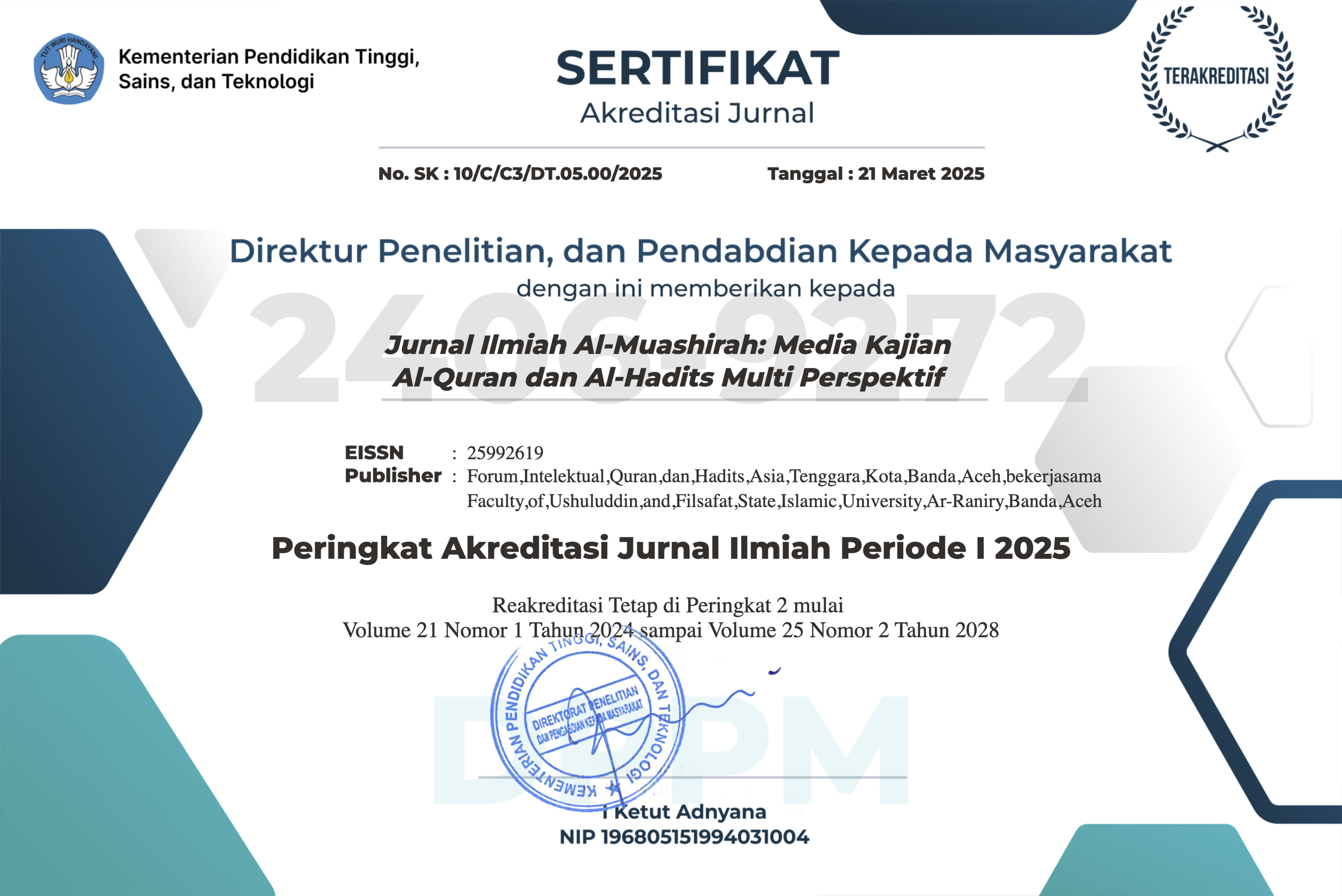Janji dan Ancaman Sebagai Metode Dakwah Alquran
DOI:
https://doi.org/10.22373/jim.v15i1.5454Keywords:
al-Quran, janji dan ancaman, metode dakwahAbstract
Al-Quran is a reference book of Islamic propagation. The Qur'an has its own way of conveying propaganda to man. There are several methods of da'wah submitted by the Qur'an, among them with methods of promise and threats. The terms promises and threats have been discussed by experts among the Mu'tazila with the concept of wa'ad and wa'id. In the book of al-Milal wa al-Nihal by AsySyahrastani mentions what is meant by wa'ad and wa'id according to ahlussunnah including the original Kalam Allah. Allah promises rewards for those who carry out His commands and threaten with torment for everyone who transgresses. Everyone who carries out his command is entitled to reward according to the promise of goodness and every wretched person has the right to be tortured for doing a prohibited act. It has nothing to do with reason. Meanwhile the Mu'tazila argue that wa'ad and wa'id are not = Allah's kalam at the time of the Azaan but the command and the prohibition, the promise of reward and the threat of punishment based on the new kalam. Whoever survives because he executes the command and gets the reward. Whoever loses because he violates the threat. As a result he got the punishment and all that was obtained through reason. Many examples of verses about promises and threats are spreading in the Qur'an. The expression of promises and threats in the Qur'an has distinctive features and editorials. Each of the verse's editors has the following characteristics: the verse editorial of the promise is usually characterized by: First, expressed by the sentence of condition, with the custom of the word man and the answer with the word fa. Secondly, the editorial of the appointment is also expressed with the sentence ististna (exceptions). Thirdly, the wording of the promise is expressed in the word wabasysyiri. Meanwhile, the verse about the threat usually has the following characteristics: First, expressed in the word wail. There are 27 times the word wail in the Qur'an. Second, expressed by the terms of condition. Third, expressed by the phrase wabasysyiri (convey the good news). Da'wah method through promise gives a very big influence to people who believe in Allah SWT. that is, first, the method of promise can motivate the believers to worship sincerely and multiply doing good. Second, people of faith and righteous deeds are more patient in facing the tough trials of life in the world. Third, it can show to the believer that how great grace is given by Allah SWT. to mankind. Fourth, giving awareness to the believer that if he has faith and works righteous the reward is not only obtained in the hereafter, but there is a reward given directly by Allah SWT. in a world of quiet, peaceful and well-off lives. The verse of the threat is also very influential to the person who believes in Allah SWT. Among these, first, people who believe in Allah SWT. and faith in the Day of Resurrection will be afraid of death and life after death. Therefore, he will be motivated to worship sincerely and multiply righteous deeds. Second, people who believe in Allah SWT. convinced that the threat of Allah SWT. against the person who rcommits the munk must be valid. Because the threat is something that is shown directly by Allah SWT. in this world.
Downloads
References
Abdul Hayy al-Farmawi, Al-Bidayah fi Tafsir al-Maudhu’i, Kairo: al-hadharah al‘Araby, 1977.
Abdul Jabbar al-Qadhi, Syarh al-Ushul al-Khamsah, Kairo: Maktabah alWahbiyah, 1965.
Ali Musthafa al-Ghurabi, Tarikh al-Firaq al-Islamiyah wa Nasyah Ilm alKalam’inda al-Muslimin, Mesir: Muhammad Ali Shubaih, t.t.Asy-Syahrastani, Al-Milal wa Al-Nihal, terj. Asywadi Syukur, Surabaya: Bina Ilmu, t.t
Departemen pendidikan Nasional, Kamus Besar Bahasa Indonesia, Jakarta: Balai Pustaka, 2005.
Harun Nasution, Teologi Islam: Aliran, Sejarah, Analisa Perbandingan. Hasjmi, Dustur Dakwah menurut al-Qur’an, cet. Ke-3, Jakarta: Bulan Bintang, 1994.
Ibn Manzur, Lisan al-‘Arab, Cet. III, Bairut: Dar ihya al-Turas al-‘Arabi, 1999.
Isa A’li, al-kafi fi Ulum al-balaghah al-a’rabiyah, Lebanon: Jamiah al-Maftuhah, 1993.
Muhammad Abu zahrah, Tarikh al-Mazahib al-Islamiyah, Kairo: Dar al-Fikr al- Arabi, t.t.
M. Amin Nurdin dan Afifi Fauzi Abbas (ed), Sejarah Pemikiran Islam, Jakarta: Amzah, 2012.
M. Quraish Shihab, Membumikan Al-Qur’an, Bandung: Mizan, 1997.
Sri Lestari, Psikologi Keluarga:Penanaman Nilai dan Penanganan konflik Keluarga, Jakarta: Kencana, Prenada Media Group, 2013
Taufik Adnan amal dan Syamsu Rizal Panggabean, Tafsir Kontekstual al-Qur’an, Bandung: Mizan, 1992.
WJS. Poerwadarminta, Kamus Umum Bahasa Indonesia, edisi ke-3, Jakarta: Balai Pustaka, 2007
Downloads
Published
Issue
Section
License
Authors who publish in Jurnal Ilmiah Al-Mu'ashirah agree to the following terms:
- Authors retain copyright and grant the journal right of first publication with the work simultaneously licensed under a Attribution-ShareAlike 4.0 International (CC BY-SA 4.0) License that allows others to share the work with an acknowledgment of the work's authorship and initial publication in this journal.
- Authors are able to enter into separate, additional contractual arrangements for the non-exclusive distribution of the journal's published version of the work (e.g., post it to an institutional repository or publish it in a book), with an acknowledgment of its initial publication in this journal.
- Authors are permitted and encouraged to post their work online (e.g., in institutional repositories or on their website) prior to and during the submission process, as it can lead to productive exchanges, as well as earlier and greater citation of published work (See The Effect of Open Access).













